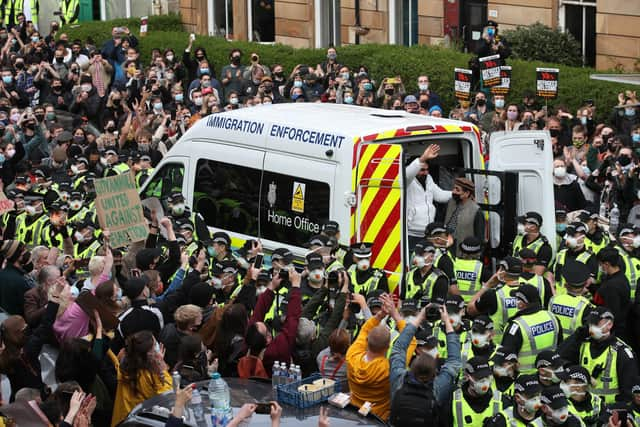Home Office notified Police Scotland in advance of failed Kenmure Street raid, but Scottish Government not told
The force did not raise any concerns with the planned operation, which saw hundreds of residents in the city’s Pollokshields area prevent the UK Immigration Enforcement vehicle from leaving the scene.
What was planned by the Home Office as a routine detention quickly escalated into a large-scale demonstration against the UK Government’s immigration policy, attracting headlines around the world.
Advertisement
Hide AdAdvertisement
Hide AdAfter a peaceful stand-off lasting several hours, the two men, Lakhvir Singh and Sumit Sehdev, both Indian nationals, were eventually released.
Police Scotland said the operational decision was taken to protect the “safety, public health and well-being” of everyone involved.
Now it has been confirmed that police were notified on the attempt to remove the two men, which coincided with the first day of Eid.
In a response to a written question put down at Westminster by Kenny MacAskill, the Alba Party MP for East Lothian, Chris Philp, the minister for immigration compliance and justice, described it as a “routine, lawful operation”.
“The police were informed of the visit in advance through an operational notification form and raised no concerns,” he said.


“Routine operations are not normally discussed with any government department prior to activity taking place, so no discussions took place with the Scottish Government prior to this visit.”
Mr MacAskill said the answer demonstrated the need for more open lines of communication between the Scottish Government, the Home Office and the Scottish Police Authority so as to put in place agreed protocols and mechanisms.
The former Scottish justice secretary said: “At a political level, the Scottish Government has to do more to demand more of a say over immigration. A second referendum on independence may have been deferred, but Scotland must have the ability to act distinctly for the good of its society and its economy.
Advertisement
Hide AdAdvertisement
Hide Ad“There also have to be protocols between Police Scotland and the Home Office. This incident shows the need for discussions about what the outcome of an operation may be, and how it will be carried out, because immigration enforcement officials look like police officers – there has to be cognisance of public safety.”
Humza Yousaf, the-then justice secretary, had said the Home Office’s operational approach left Police Scotland in an “invidious position”.
Robina Qureshi, director of Positive Action in Housing, a Glasgow-based refugee and migrant homelessness charity, was among those to question the role of Police Scotland in the raids.
She said the force, together with the Scottish Government, should decline requests to attend the scene of UK Immigration Enforcement operations.
The force has said that it does not assist in any such operations, with its officers present to police protests and ensure public safety.
But stressing the need for clarity, Mr MacAskill said: “This is quasi-political. Police Scotland has to support immigration enforcement – that’s unanswerable until such time as the political circumstances change. But the Scottish Police Authority has a role to broker a way through this.
“It won’t stop people being removed, which is the UK Border Force’s right, but it has to be in a manner in which Police Scotland are not used like some kind of militia.”
